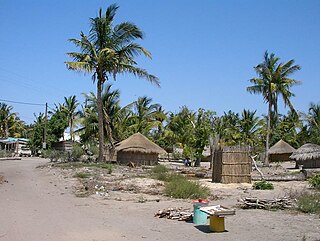Mozambique was a Portuguese colony, overseas province and later a member state of Portugal. It gained independence from Portugal in 1975.

The Mozambique Defence Armed Forces or FADM are the national armed forces of Mozambique. They include the General Staff of the Armed Forces and three branches of service: Army, Air Force and Navy.

RENAMO is a Mozambican political party and militant group. The party was founded with the active sponsorship of the Rhodesian Central Intelligence Organisation (CIO) in May 1977 from anti-communist dissidents opposed to Mozambique's ruling FRELIMO party. RENAMO was initially led by André Matsangaissa, a former senior official in FRELIMO's armed wing, and was composed of several anti-communist dissident groups which appeared immediately prior to, and shortly following, Mozambican independence. Matsangaissa, who died in 1979, was succeeded by Afonso Dhlakama, who led the organization until he died in 2018. He was succeeded by Ossufo Momade.

The United Nations Operations in Mozambique was a UN peace mission to Mozambique established in December 1992 under Security Council Resolution 797 with the assignment to monitor the implementation of the Rome General Peace Accords agreed upon by the Mozambican president Joaquim Chissano of FRELIMO, the Front for Liberation of Mozambique, and Afonso Dhlakama of RENAMO, the Mozambican National Resistance. The operation was one of the most significant and extensive UN operations and it sought to demobilize and disarm troops, provide humanitarian aid, and oversee the elections. The operation ended in December 1994.
The Rome General Peace Accords, officially the General Peace Accords, was a peace treaty signed between the government of Mozambique and RENAMO, ending the Mozambican Civil War on October 4, 1992. Negotiations preceding the agreement began in July 1990. They were brokered by a team of four mediators, two members of the Community of Sant'Egidio, Andrea Riccardi and Matteo Zuppi, as well as Bishop Jaime Gonçalves and Italian government representative Mario Raffaelli. The delegation of the Mozambican government was headed by Armando Guebuza, who went on to become President of Mozambique. The RENAMO delegation consisted of Raul Domingos, José de Castro, Vicente Ululu, Agostinho Murrial, João Almirante, José Augusto and Anselmo Victor. The accords were then signed by the then-president of Mozambique Joaquim Chissano, and by the leader of RENAMO, Afonso Dhlakama.

The Mozambican Civil War was a civil war fought in Mozambique from 1977 to 1992. Like many regional African conflicts during the late twentieth century, the impetus for the Mozambican Civil War included local dynamics exacerbated greatly by the polarizing effects of Cold War politics. The war was fought between Mozambique's ruling Marxist Mozambique Liberation Front (FRELIMO), the anti-communist insurgent forces of the Mozambican National Resistance (RENAMO), and a number of smaller factions such as the PRM, UNAMO, COREMO, UNIPOMO, and FUMO.

United Nations Security Council resolution 797, adopted unanimously on 16 December 1992, after reaffirming Resolution 782 (1992), the Council decided to establish the United Nations Operation in Mozambique (ONUMOZ) as proposed by the Secretary-General Boutros Boutros-Ghali in line with the peace agreement for Mozambique.

United Nations Security Council Resolution 813, adopted unanimously on 26 March 1993, after reaffirming Resolution 788 (1992) and determining that the situation in Liberia constituted a threat to international peace and security, the Council condemned the failure of the parties in the country – the Armed Forces of Liberia, ULIMO, National Patriotic Front of Liberia and Independent National Patriotic Front of Liberia among others, to implement the Yamoussoukro IV Accord.

United Nations Security Council resolution 818, adopted unanimously on 14 April 1993, after reaffirming resolutions 782 (1992) and 797 (1992) on the situation in Mozambique, the Council stressed its concern regarding the delays and difficulties affecting the implementation of the peace process envisaged in the Rome General Peace Accords during the Mozambican Civil War.

United Nations Security Council resolution 850, adopted unanimously on 9 July 1993, after reaffirming resolutions 782 (1992), 797 (1992) and 818 (1993) on the situation in Mozambique, the Council discussed the implementation of the Rome General Peace Accords and the formation of a new armed forces in the country.

United Nations Security Council resolution 863, adopted unanimously on 13 September 1993, after reaffirming resolutions 782 (1992), 797 (1992), 818 (1993) and 850 (1993) on the situation in Mozambique, the council discussed the implementation of the Rome General Peace Accords.

United Nations Security Council resolution 879, adopted unanimously on 29 October 1993, after reaffirming resolutions 782 (1992), 797 (1992), 818 (1993), 850 (1993) and 863 (1993) on the situation in Mozambique, the Council reiterated the importance of the Rome General Peace Accords and extended the mandate of the United Nations Operation in Mozambique for an interim period ending 5 November 1993.

United Nations Security Council resolution 882, adopted unanimously on 5 November 1993, after reaffirming resolutions 782 (1992) and subsequent resolutions on Mozambique, the council noted, in addition to positive developments in the country, that some aspects of the Rome General Peace Accords had not been implemented.

United Nations Security Council resolution 893, adopted unanimously on 6 January 1994, after reaffirming resolutions 812 (1993), 846 (1993), 872 (1993) and 891 (1993) on Rwanda, the Council noted that the situation in Rwanda could have implications for neighbouring Burundi and authorised the deployment of a second military battalion of the United Nations Assistance Mission for Rwanda (UNAMIR) to the demilitarised zone.

United Nations Security Council resolution 898, adopted unanimously on 23 February 1994, after reaffirming Resolution 782 (1992) and all subsequent resolutions on Mozambique, the Council discussed the implementation of the Rome General Peace Accords and established a 1,144 strong police component of the United Nations Operation in Mozambique (ONUMOZ).
United Nations Security Council resolution 916, adopted unanimously on 5 May 1994, after reaffirming Resolution 782 (1992) and all subsequent resolutions on Mozambique, the council decided to renew the mandate of the United Nations Operation in Mozambique (ONUMOZ) for a final period ending 15 November 1994, and discussed the implementation of the Rome General Peace Accords.

United Nations Security Council resolution 957, adopted unanimously on 15 November 1994, after reaffirming Resolution 782 (1992) and all subsequent resolutions on Mozambique, the Council welcomed the recent elections on 27–29 October 1994 in accordance with the Rome General Peace Accords and extended the mandate of the United Nations Operation in Mozambique (ONUMOZ) until a new government took office, but no later than 15 December 1994, with a full withdrawal by 31 January 1995.

United Nations Security Council resolution 960, adopted unanimously on 21 November 1994, after reaffirming Resolution 782 (1992) and all subsequent resolutions on Mozambique, the Council welcomed and endorsed the recent elections on 27–29 October 1994 in accordance with the Rome General Peace Accords, noting a declaration that they were free and fair by the Special Representative of the Secretary-General.

The RENAMO insurgency was a guerrilla campaign by militants of the RENAMO party and one of its splinter factions in Mozambique. The insurgency was widely considered to be an aftershock of the Mozambican Civil War; it resulted in renewed tensions between RENAMO and Mozambique's ruling FRELIMO coalition over charges of state corruption and the disputed results of the 2014 general elections.
The Maputo Accord, officially the Maputo Accord for Peace and National Reconciliation, is a peace agreement between the Government of Mozambique and Renamo, signed on 6 August 2019, with the aim of bringing definitive peace to Mozambique. The agreement was signed by the President of the Republic of Mozambique, Filipe Nyusi, and the leader of Renamo, Ossufo Momade, in Maputo, and was the result of years of negotiations. It was preceded by the signing of the Agreement on the Definitive Cessation of Military Hostilities, on 1 August 2019, in Gorongosa.
















